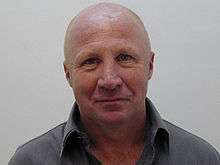Carlos Mac Allister
 | |||
| Personal information | |||
|---|---|---|---|
| Full name | Carlos Javier Mac Allister | ||
| Date of birth | March 6, 1968 | ||
| Place of birth | Pergamino, Argentina | ||
| Height | 1.75 m (5 ft 9 in) | ||
| Playing position | Left Back | ||
| Senior career* | |||
| Years | Team | Apps | (Gls) |
| 1986–1992 | Argentinos Juniors | 120 | (5) |
| 1992–1996 | Boca Juniors | 124 | (5) |
| 1996–1998 | Racing Club | 23 | (0) |
| 1998–1999 | Ferro Carril Oeste | 35 | (1) |
| National team | |||
| 1993 | Argentina | 3 | (0) |
|
* Senior club appearances and goals counted for the domestic league only. | |||
Carlos Javier Mac Allister (born March 6, 1968) is a former Argentine former football player who played three international matches for Argentina in 1993 as a left-back.
Club career
He debuted for Argentinos Juniors in 1986, and became notable for his passion for the game, his personality, as well as his red hair. He transferred to Boca Juniors in 1992 he scored the winning goal in the gold cup final.[1] In 1996, he lefts Boca for Racing Club where he played until 1998 when he played one final season with Ferro Carril Oeste before retiring at the age of 30.[2]
Titles
| Season | Team | Title |
|---|---|---|
| Apertura 1992 | Primera División Argentina | |
| 1993 | Copa de Oro Nicolás Leoz | |
International career
In 1993, he played for Argentina in the qualifiers for the 1994 Fifa World Cup alongside such notables as Diego Maradona, Fernando Redondo, Sergio Goycochea, Oscar Ruggeri and Diego Simeone. He was brought into the team in late 1993 following the disastrous loss to Colombia on 05/09/1993 in Buenos Aires, and played in the following international games for Argentina:
- 31/10/1993 - 1-1 draw vs Australia played in Sydney. - 1994 World Cup Qualifiers
- 17/11/1993 - 1-0 victory vs Australia played in Buenos Aires - 1994 World Cup Qualifiers
- 15/12/1993 - 2-1 victory vs Germany played in Miami - Friendly
However, despite having never played in a losing team for Argentina, he was not selected for the finals and did not play in the 1994 Fifa World Cup itself.
Post career
In 1998 the Mac Allister brothers, Carlos Javier and Carlos Patricio decided to found their own sports club for youngsters, the MacAllister Sports Club. They acquired a four-hectare piece of land situated 5 km away from the centre of Santa Rosa City, where they built their own club to instruct and promote soccer players for their subsequent insertion in the professional soccer.[3]
References
- ↑ "Todavía estoy buscando mi camino". Retrieved 2015-10-15.
- ↑ http://rivadavia.com.ar/articulos/mac-allister-sobre-macri-mi-jefe-politico-es-mucho-mejor-trabajando-que-hablando. Missing or empty
|title=(help) - ↑ Macallister Sports Club
External links
- FIFA Player Statistics
- Carlos Mac Allister at National-Football-Teams.com
- (Spanish) Argentine Primera statistics
- (Spanish) Ficha de Carlos Javier Mac Allister at Bdfa.com.ar